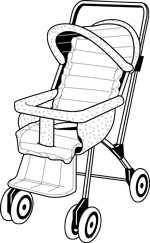Expecting: The English of Pregnancies
 |
Click to get this lesson as an Adobe Acrobat file for printing or use in a class. |
 |
Click to listen to this lesson while you read. |
My wife, Christine, is pregnant! You might not care, but the announcement big news in our family. A pregnancy is big news in any family. And so, talking about pregnancy is going to be the topic for this week.
Click Here for Step-by-Step Rules, Stories and Exercises to Practice All English Tenses
Do you need this vocabulary?
For those of you who already have your children, you know that this is a topic that gets re-visited over and over again. For those of you who don't expect children at all or any time soon, I can tell you that expecting parents – that is, parents-to-be – won't give you any choice: it's something you will find yourself talking about in English, if you wait long enough.
During the week, there will be three listening exercises, and a quiz at the end. Until then, here's your chance to brush-up on your pregnancy vocabulary. These are the words you'll be hearing in the listening activities.

Vocabulary
Pregnant / Pregnancy: Pregnant is the "status" or "'state" of a woman who will have a baby in the next nine months. After six months or so, you can recognize a pregnant woman on the size of her stomach! Pregnant is an adjective, but there is a noun form of the word: pregnancy. A pregnancy refers to the months in which a woman is pregnant. You will hear people often women – refer to a "difficult pregnancy" or a "dangerous pregnancy."
Expecting: To "expect" normally means "to think – almost know – something or someone is coming." If I believe that it will rain tomorrow, then I expect rain. If my sister says she'll call at five, I expect a phone call at five (though, really, I expect my sister to be late).
In the progressive (-ing) form, though, "expecting" often means "expecting a child," or the same as pregnant. (Note: you can't say a woman "expects" and mean she is pregnant. We always use the word "expecting" when we talk about pregnancy.)
Due: If your teacher gives you homework to do and tells you to bring it back on Friday, then your homework is due on Friday. (We already talked about this meaning of the word, once.) It simply means, that's when the teacher expects you to have the homework done. When we talk about pregnant women, however, we use it to mean when the baby should be born. My wife, for example, is due in August. That means, we have plans to have a bigger family in August. You can also say the baby is due in August.
Stroller: Babies don't drive cars. And babies can't walk by themselves. When parents want to go somewhere with their babies, they stick them in a kind of wagon or cart with wheels, and push the wagon around. This wagon is called a stroller.
The word stroller comes from the word "stroll" which is an old-fashioned word for "to take a walk." The British word for a stroller, a "perambulator," comes from the word "perambulate," which is an even older word for "to take a walk." The important thing is this: when you walk with your baby, you put it in a stroller.

Crib: Babies don't sleep in normal beds. They have their own, special beds that they can't fall out of. They have cribs. A crib is a bed just the right size for a baby, with walls, or "bars" to keep the baby from falling out.
To be (feeling) for someone: I'm sure you know what it means to be happy. I think you probably even know what it means to be excited or scared. But, what if your best friend is really happy, if he's won the lottery or had a baby and you're happy only because he's happy? Then you are happy for your best friend.
If your brother is doing something dangerous and you're scared that something might happen to him, you are scared for your brother. We use the phrase "to be (feeling) for someone" when we want to say that what we feel is because of what happened to someone else.
Announcement: If you open your newspaper, can you find a page where people put ads in to say "We have had a baby." Or "we are married." Or even "John Pierce died on Friday." These kinds of ads are common in the U.S. and in Germany, maybe in your country, too. They are announcements.
An announcement is any time you take the effort to spread information usually about something that has just happened around. An ad in the newspaper is an announcement to the world, in general. My wife and I mailed birth announcements to our family and friends.
Get Updates, Special Offers, and English Resources
Download your FREE GIFT (the first two chapters of
English Short Stories Book and Workbook)
as soon as you join!

By submitting your email, you consent to receiving updates and newsletters from us and to the sharing of your personal data with third parties for the purposes of sending you communications. We will not spam you. You can unsubscribe at any time. For more information, please see our privacy policy.








